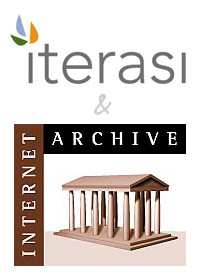
There are several active web archives around the world. One of the biggest and most talked about is the Internet Archive (Archive.org). We are often asked how Iterasi is different from organizations such as the Internet Archive.
The biggest difference, by far, is that other web archives are non-profit organizations looking to preserve important historical and cultural records, and Iterasi is a for-profit company interested in giving businesses and government agencies full control over their web archive.
Here’s part of the Internet Archive’s mission:
“The Internet Archive is working to prevent the Internet – a new medium with major historical significance – and other ‘born-digital’ materials from disappearing into the past.”
All current web archives have a cultural and historical goal similar to this one, which means they archive only what is important from a cultural perspective. This is exceptional work for creating a cultural memory of online content, but often does not serve the needs of businesses, legal professionals, and government agencies.
Iterasi, on the other hand, seeks to provide web archiving to businesses and government agencies who need to create archives of web communication for records keeping and compliance purposes. IterasiArchives, our flagship product, can archive any public website, RSS feed, web search, or individual web page. What’s more, with IterasiArchives you can schedule how often the pages and sites you choose will be archived, giving users complete control over what they want archived, and how often.
As the web becomes an ever more important part of our communications, it is important (and sometimes required) to archive and keep records of those web-based communications. Iterasi provides an industrial strength business solution to collect and store your online communication to fit your needs.
There are several other ways in which Iterasi is different than the Internet Archive. Here are a few:
- User Interface: Iterasi’s user interface allows you to organize, tag and search across all of the pages in your archive.
- Custom Archiving: With IterasiArchives you can choose the exact pages, sites, searches and feeds that you want to archive. The Internet Archive and other web archives can not guarantee that they have archives of what you need.
- Scheduled website archiving: You set the schedule for your archived sites and pages. Every 15 minutes? Every day? Every month? With IterasiArchives you decide.
- Iterasi’s TrueArchive Technology: We developed our own technology for capturing and archiving webpages which enables us to archive even the most complex webpages on the net. Our TrueArchive technology is the strongest on the web for creating valid, high-fidelity web archives.
Organizations like the Internet Archive are creating web archives as a general service to the community. Iterasi aims to provide a detailed and focused solution for compliance, record keeping and brand heritage to the government and corporate industries.







{ 3 comments… read them below or add one }
Hi Pete,
How Iterasi compares to Hanzo Archives?
http://www.hanzoarchives.com/
Regards
Ramon
Ramon, Hanzo Archives is a similar business model to us, but there are several differences between our archiving and theirs. For instance, we are the only web archiving company who uses TrueArchive tech to get more accurate page captures of even very complex pages using Javascript, AJAX, etc.
You can check out our features page to learn more about some other differences: http://www.iterasi.net/features/
Thanks Ramon! Please don’t hesitate to contact us with any other questions: http://www.iterasi.net/contact/
Hi Chase,
Thanks for the clarifications.
Currently, we (my colleague and I) are looking for a Web eDiscovery solution for our company based in “Sao Paulo” (Brasil).
Iterasi seems to deliver the most advanced solutions for that purpose compared to Hanzo Archivs (their web site lacks examples or real demo. May be I’m wrong).
I’d me more than happy to see a new comparison on this blog between Iterasi’s TrueArchive tech and “Hanzo” Archives (as you did with “Internet Archives”). This will help us decide where to go.
Note: you might be interested on “ArchiveIt”. Also from “Internet Archives”:
http://www.archive-it.org
Regards
Ramon